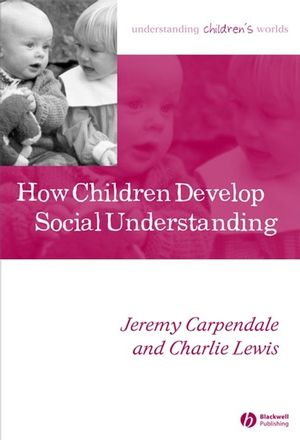How Children Develop Social UnderstandingISBN: 978-1-4051-0549-1
Hardcover
328 pages
May 2006, Wiley-Blackwell
 This is a Print-on-Demand title. It will be printed specifically to fill your order. Please allow an additional 10-15 days delivery time. The book is not returnable.
|
||||||
"This extraordinarily comprehensive book provides a lucid
account of how children develop social understanding. The authors
promise broad inquiry into social development and they consistently
deliver pushing well beyond a thorough review of the enormous body
of prior work on theory of mind. This book will awaken interest in
key developmental questions by a new generation of students who
become acquainted with the book in upper level seminars or graduate
courses where it most certainly should be assigned." Nancy
Budwig, Professor of Psychology, Clark University, USA
"Carpendale and Lewis provide an exceptionally clear analysis of
the prominent theoretical explanations of children’s
understanding of beliefs. This work won’t end debate, but it
may fundamentally revise the research agenda so that the steps
along the way to social understanding are more fully revealed."
Professor Hildy Ross, University of Waterloo, Canada
"Professors searching for a theoretically rigorous and
empirically accurate text to introduce students to the development
of children’s social cognition will find what they seek in
this text. So too will more advanced scholars and students who
desire a comprehensive and incisive treatment of the increasingly
vast literature on this topic, and the many lively debates it
excites. Hats off to Carpendale and Lewis for a job well done."
Jack Martin, Fraser University
"How Children Develop Social Understanding is an
appreciable piece of work, and I hope Carpendale and Lewis will
continue in their successful effort to give us a thoughtful view of
children's social-cognitive development. Furthermore, I hope that
this book will attract new young researchers from all over the
world to the study of a fabulous topic, the development of the
child as a social human being." PsycCRITIQUES Volume 51, Issue
43
"This is an important book, and it succeeds on many levels. Most notably, the extensive literature on children's theory of mind is masterfully reviewed and critically assessed in relation to the accumulated findings, replications of findings, and failures to replicate." Human Development 2006; Issue 49



